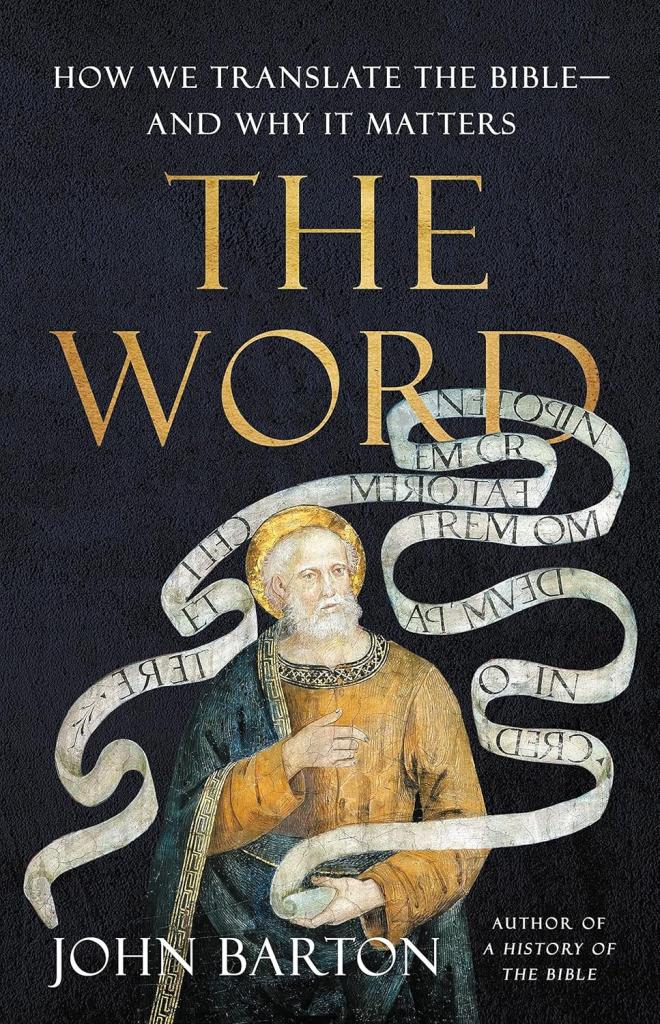This is, without question, one of the most erudite and at the same time accessible, surveys of the dilemmas that translators face in translating the Bible, not only into English but into many other languages as well. The Bible is of course the most sold, the most bought, the most translated work in all of human history– by a lot. It behooves all Christians who care about the Bible to know something about how it came to be put together, why it has been translated as it has and is, and why it matters to not only Christian faith but also to Jewish faith as well. Below is the brief Intro summary to the book found on Amazon.
“Throughout history, most Jewish and Christian believers have understood scripture not in the languages in which it was first written but rather in their own—in translation. In The Word, acclaimed Bible scholar John Barton explores how saints and scholars have negotiated the profound challenges of translating the Bible while remaining faithful to the original. In addition to considering questions of literal versus free translation, literary style, inclusive language, and more, Barton draws out scriptural translation’s role at critical junctures in religious history. Far from a mere academic exercise, biblical translation has shaped how we answer faith’s most enduring questions about the nature of God, the existence of the soul, and the possibility of salvation.”
As I tell my students repeatedly, every translation of the Bible is already an interpretation of the original, and absolutely no translation into any language, including English is perfect or without flaws and mistakes. This is one of the reasons I advise lovers of the Bible to read it in several translations. And much depends on the purpose of a given translation, and what use the buyer wants to put it to, that determines which translation is suitable for a particular audience. John Barton does far more than just explain the difference between formal and functional equivalence translations, and what are the pluses and minuses of each sort. He also helps us understand that what we should look for in a translation— namely adequacy considering its intended purpose and audience, a due attention to the various genre of literature in the Bible, a clear sense of the purpose, without trying to be all things to all audiences, a recognition of the dilemmas the translator faces since English for example, has no exact equivalence for some Hebrew, Aramaic, or Greek words found in the Bible, which means that an overly literal rendering word for word becomes rather impossible in some cases, but it also means that an overly periphrastic rendering always stands in danger of inserting foreign ideas into the text of the translation.
There are many helpful insights and explanations throughout this book which runs to just over 300 pages counting notes and bibliography. It is a work that reflects the long reflection and study of these matters by a first class scholar. And it is full of interesting suggestions and careful conclusions as well—- for instance, since most early Christians, including most writers of the NT used the Greek translation of the OT in quoting or paraphrasing the Bible, should Christians today revive the tradition, never abandoned in the Orthodox tradition, particularly the Greek Orthodox tradition, that the Greek OT and so the whole Greek Bible is the genuine Christian Bible, not least because the LXX was produced by Jews anyway, just as the Hebrew text of the OT was? Inquiring minds want to know. As Barton says “This would mark an enormous shift for Protestants and Catholics alike…It would appear to undermine at a stroke the insight, crucial in modern interfaith dialogue, that Jews and Christians share the Scriptures of the Hebrew Bible, even though they of course differ where the New Testament is concerned” (p. 257). As things now stand, only Protestants and Jews are in agreement as to what the full OT canon includes, however differently the two groups arrange the books.
I commend this book wholeheartedly as one that raises our level of understanding of translation issues, and raises the right questions of how we should view any and all translations. There are better ones, and there are less adequate ones, but no perfect one, for God did not see fit to send down the Bible on golden plates from heaven that preserved the original source texts of the OT in Hebrew and Aramaic and the NT in Greek, and even had God done so— there would still have been various translations into various languages ancient and modern, not to mention major mistakes in treating translations as if they were the original languages of the Bible. Consider for example the history of the Western church in which Latin became the official language of both the church and the Bible itself, a language in which no Biblical book was originally written! As the Reformation duly warned– we need to say Caveat Emptor— let the buyer beware. The church has made many mistakes along the way, in rendering those ancient languages into some living and at least one defunct language– Latin.














